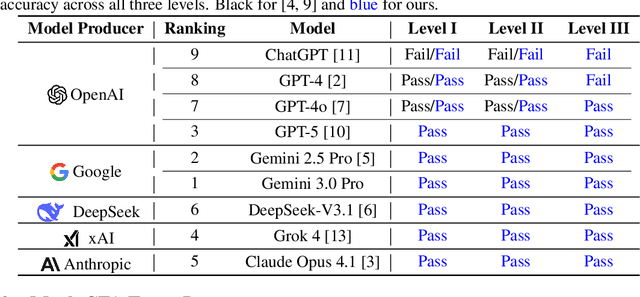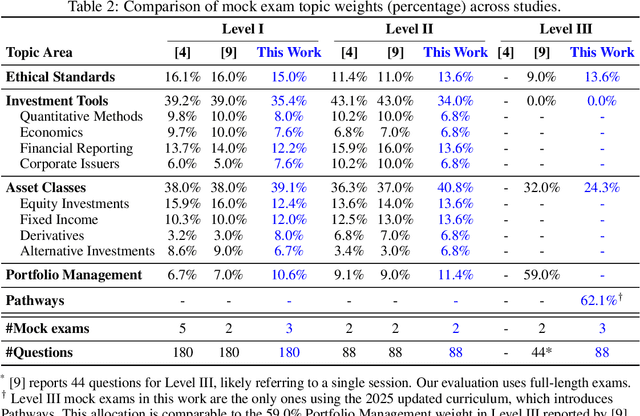Kaiwen He
Reasoning Models Ace the CFA Exams
Dec 09, 2025



Abstract:Previous research has reported that large language models (LLMs) demonstrate poor performance on the Chartered Financial Analyst (CFA) exams. However, recent reasoning models have achieved strong results on graduate-level academic and professional examinations across various disciplines. In this paper, we evaluate state-of-the-art reasoning models on a set of mock CFA exams consisting of 980 questions across three Level I exams, two Level II exams, and three Level III exams. Using the same pass/fail criteria from prior studies, we find that most models clear all three levels. The models that pass, ordered by overall performance, are Gemini 3.0 Pro, Gemini 2.5 Pro, GPT-5, Grok 4, Claude Opus 4.1, and DeepSeek-V3.1. Specifically, Gemini 3.0 Pro achieves a record score of 97.6% on Level I. Performance is also strong on Level II, led by GPT-5 at 94.3%. On Level III, Gemini 2.5 Pro attains the highest score with 86.4% on multiple-choice questions while Gemini 3.0 Pro achieves 92.0% on constructed-response questions.
Structure-Aware Spectral Sparsification via Uniform Edge Sampling
Oct 14, 2025Abstract:Spectral clustering is a fundamental method for graph partitioning, but its reliance on eigenvector computation limits scalability to massive graphs. Classical sparsification methods preserve spectral properties by sampling edges proportionally to their effective resistances, but require expensive preprocessing to estimate these resistances. We study whether uniform edge sampling-a simple, structure-agnostic strategy-can suffice for spectral clustering. Our main result shows that for graphs admitting a well-separated $k$-clustering, characterized by a large structure ratio $\Upsilon(k) = \lambda_{k+1} / \rho_G(k)$, uniform sampling preserves the spectral subspace used for clustering. Specifically, we prove that uniformly sampling $O(\gamma^2 n \log n / \epsilon^2)$ edges, where $\gamma$ is the Laplacian condition number, yields a sparsifier whose top $(n-k)$-dimensional eigenspace is approximately orthogonal to the cluster indicators. This ensures that the spectral embedding remains faithful, and clustering quality is preserved. Our analysis introduces new resistance bounds for intra-cluster edges, a rank-$(n-k)$ effective resistance formulation, and a matrix Chernoff bound adapted to the dominant eigenspace. These tools allow us to bypass importance sampling entirely. Conceptually, our result connects recent coreset-based clustering theory to spectral sparsification, showing that under strong clusterability, even uniform sampling is structure-aware. This provides the first provable guarantee that uniform edge sampling suffices for structure-preserving spectral clustering.
Personalized Federated Learning for Intelligent IoT Applications: A Cloud-Edge based Framework
Mar 19, 2020



Abstract:Internet of Things (IoT) have widely penetrated in different aspects of modern life and many intelligent IoT services and applications are emerging. Recently, federated learning is proposed to train a globally shared model by exploiting a massive amount of user-generated data samples on IoT devices while preventing data leakage. However, the device, statistical and model heterogeneities inherent in the complex IoT environments pose great challenges to traditional federated learning, making it unsuitable to be directly deployed. In this article we advocate a personalized federated learning framework in a cloud-edge architecture for intelligent IoT applications. To cope with the heterogeneity issues in IoT environments, we investigate emerging personalized federated learning methods which are able to mitigate the negative effects caused by heterogeneity in different aspects. With the power of edge computing, the requirements for fast-processing capacity and low latency in intelligent IoT applications can also be achieved. We finally provide a case study of IoT based human activity recognition to demonstrate the effectiveness of personalized federated learning for intelligent IoT applications.
DeepCP: Deep Learning Driven Cascade Prediction Based Autonomous Content Placement in Closed Social Network
Mar 09, 2020



Abstract:Online social networks (OSNs) are emerging as the most popular mainstream platform for content cascade diffusion. In order to provide satisfactory quality of experience (QoE) for users in OSNs, much research dedicates to proactive content placement by using the propagation pattern, user's personal profiles and social relationships in open social network scenarios (e.g., Twitter and Weibo). In this paper, we take a new direction of popularity-aware content placement in a closed social network (e.g., WeChat Moment) where user's privacy is highly enhanced. We propose a novel data-driven holistic deep learning framework, namely DeepCP, for joint diffusion-aware cascade prediction and autonomous content placement without utilizing users' personal and social information. We first devise a time-window LSTM model for content popularity prediction and cascade geo-distribution estimation. Accordingly, we further propose a novel autonomous content placement mechanism CP-GAN which adopts the generative adversarial network (GAN) for agile placement decision making to reduce the content access latency and enhance users' QoE. We conduct extensive experiments using cascade diffusion traces in WeChat Moment (WM). Evaluation results corroborate that the proposed DeepCP framework can predict the content popularity with a high accuracy, generate efficient placement decision in a real-time manner, and achieve significant content access latency reduction over existing schemes.
 Add to Chrome
Add to Chrome Add to Firefox
Add to Firefox Add to Edge
Add to Edge